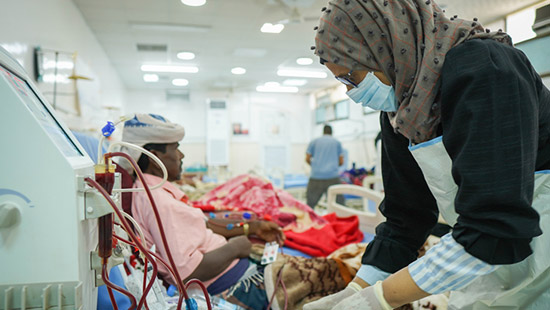 30 June 2020 – Over the past 8 months, WHO and the King Salman Humanitarian Aid and Relief Centre (KSrelief) have joined forces to ensure access to health care for the vulnerable in remote areas through the provision of a minimum service package. The support has enabled WHO to sustain the health system at primary and secondary levels, by allowing 293 facilities to remain functional and provide health access to 4.3 million people.
30 June 2020 – Over the past 8 months, WHO and the King Salman Humanitarian Aid and Relief Centre (KSrelief) have joined forces to ensure access to health care for the vulnerable in remote areas through the provision of a minimum service package. The support has enabled WHO to sustain the health system at primary and secondary levels, by allowing 293 facilities to remain functional and provide health access to 4.3 million people.
This support has also allowed WHO to prioritize the procurement and delivery of lifesaving medicines, including treatment for patients with chronic life-threatening conditions, through which more than 110 340 dialysis sessions were delivered to 5500 patients at risk of kidney failure, contributing up to 50% of the total costs of the dialysis sessions among all 21 centres available in the country.
The partnership between WHO and KSrelief has supported immunization of 65 673 children with pentavalent vaccine against (diphtheria, pertussis, tetanus, hepatitis B and Haemophilus influenzae type b) at fixed health facilities across the country. Moreover, nearly 94 352 women were assisted for safe birth deliveries and 23 198 caesarean sections allowed women to safely deliver. WHO was also able to provide over 160 534 major and minor surgeries.
As KSrelief has been the main funding partner of WHO in 2019–2020, their generous donation supported up to 72% of more than 4 million total consultations reported between October 2019 and May 2020.
Though much has been accomplished, more needs to be done to secure Yemenis’ right to health and to save many more lives, now more than ever with the added burden and unprecedented threat of COVID-19.
Now more than ever Yemen’s health system needs support
More than 5 years of humanitarian crisis have turned Yemen into the world’s worst humanitarian crisis, with more than 80% of the population, approximately 24 million people requiring some form of humanitarian assistance and protection. The crisis has crippled an already ailing health system, with only 51% of health facilities fully or partially functional with an acute shortage of trained staff, medicines, equipment, fuel and water. This has left Yemeni people’s right to health hanging by a thread, as nearly 19.7 million are in need of health care access. And now, the already vulnerable people of Yemen are faced with the added threat of COVID-19. With wealthy countries struggling to contain the virus, in Yemen the added burden on medical facilities could result in a catastrophic death toll.








